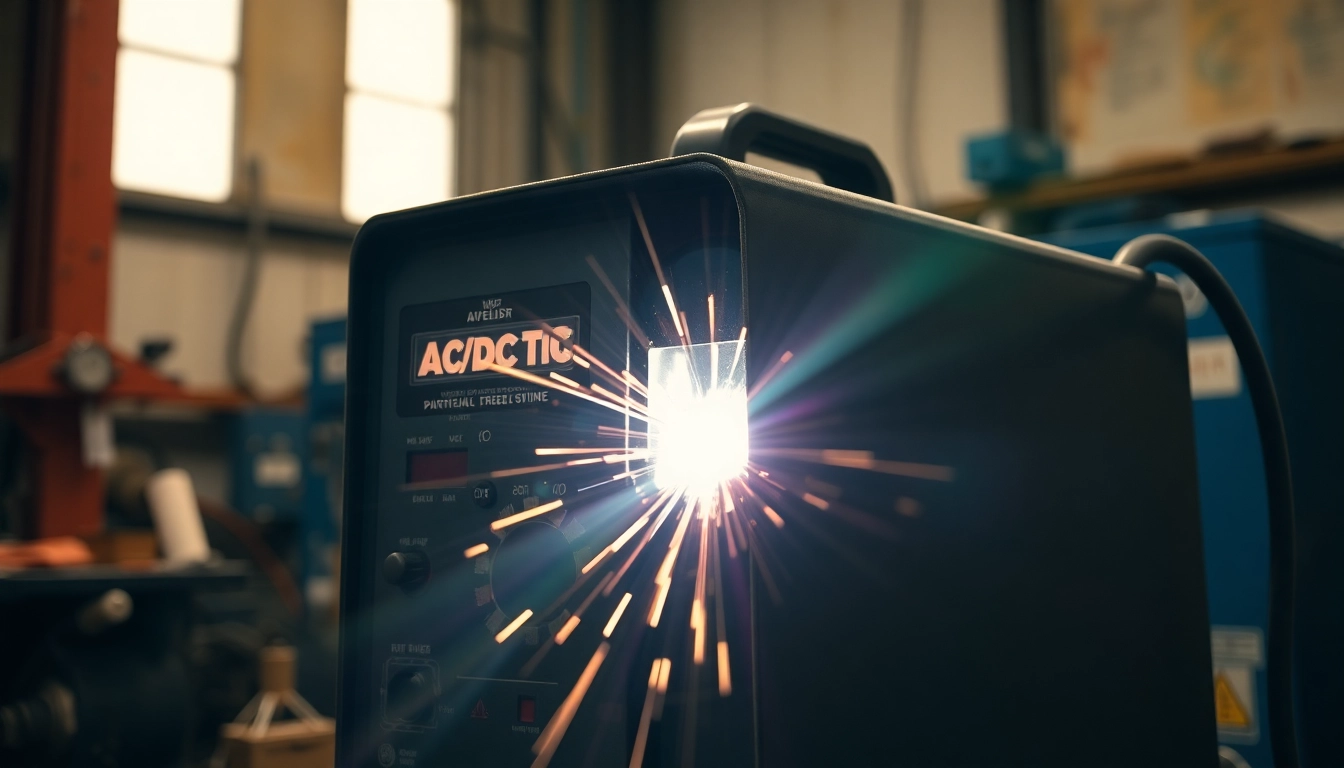Understanding AC DC TIG Welders
What is an AC DC TIG Welder?
An AC DC TIG welder is a versatile type of welding machine that can utilize both alternating current (AC) and direct current (DC) to perform Tungsten Inert Gas (TIG) welding. The ability to switch between AC and DC provides significant advantages, allowing welders to join a wider variety of materials with different thicknesses and properties. AC is particularly suitable for welding non-ferrous metals, such as aluminum and magnesium, while DC is preferred for ferrous metals like steel and stainless steel. This flexibility makes the AC DC TIG welder a vital tool in various industries and applications.
Benefits of Using AC DC TIG Welders
AC DC TIG welders offer numerous benefits, making them a popular choice among professionals and hobbyists alike. Some of the key advantages include:
- Versatility: The ability to weld both AC and DC allows users to work with different types of metals and materials.
- Precision Welding: TIG welders create precise, clean welds with minimal spatter, making them ideal for intricate work.
- Control over Heat and Material: The current type can be adjusted according to the material thickness and type, allowing for better heat control.
- Quality of Finish: AC DC TIG welding generally produces high-quality welds with aesthetically pleasing finishes, which is crucial for applications where appearance matters.
Differences Between AC and DC TIG Welding
The primary difference between AC and DC TIG welding lies in the direction of the electrical flow. In DC welding, the current flows in one direction only, which provides a stable arc that is suitable for welding ferrous metals. This stability results in a smoother operation and is optimal for most applications where heat control is critical.
In contrast, AC welding alternates the electrical current’s direction, allowing for higher cleaning action on non-ferrous metals. This oscillation helps to remove impurities, such as oxides, from the surface of the materials being welded. Thus, understanding when to use each current type is crucial for achieving the desired results.
Key Features to Look For
Wattage and Amperage Considerations
When selecting an AC DC TIG welder, wattage and amperage are fundamental specifications to consider. The wattage will typically determine the power capacity of the welder, affecting the types of materials and thicknesses it can handle. Amperage settings allow the operator to control the heat output significantly. Most models will have a range of 10 to 300 amps, with higher amps being necessary for thicker materials.
It is also essential to consider the welder’s output capabilities. An AC DC TIG welder should deliver sufficient power for heavy-duty applications while also performing well with thin materials.
Duty Cycle and Performance
The duty cycle is a critical metric that indicates how long the welder can operate before it needs to cool down. This is a significant consideration for commercial users who may be working on large projects requiring prolonged welding sessions. Look for models with at least a 60% duty cycle at maximum output for optimal performance during high-volume tasks.
Performance metrics such as arc stability and consistency are also vital. A welder with a smooth and stable arc will significantly reduce the chances of defects or failures in the welds.
Portability and Design
Portability can be a crucial factor, especially for fieldwork or situations where the welder needs to be moved frequently. Lightweight, compact models are ideal for traveling welders, while those with wheels or integrated carrying handles enhance mobility. Additionally, look for durable designs that can withstand the rigors of transport.
Ergonomic considerations can also enhance user comfort and efficiency. Features like adjustable legs, easy-to-reach controls, and user-friendly interfaces contribute to a more seamless welding experience.
Best AC DC TIG Welders on the Market
Top Choices for Professionals
For professionals seeking maximum performance and reliability, several AC DC TIG welders stand out:
- Miller Dynasty 400: Known for its inverter technology, this welder provides superior arc performance, allowing for high-quality welds in various conditions.
- Lincoln Electric Square Wave TIG 200: This model features advanced technology for precise control and a variety of settings, making it ideal for both beginners and seasoned professionals.
- Everlast PowerTIG 250EX: With a robust duty cycle and dual voltage capability, this welder is favored for its versatility and power, suitable for both thin and thick materials.
Best Budget Options
Not everyone requires a high-end model; there are excellent budget-friendly options available that still deliver quality performance:
- PrimeWeld TIG225X: This welder offers great value, featuring an IGBT inverter that maximizes efficiency while still providing solid performance.
- Eastwood 200 AC/DC TIG Welder: An affordable option that does not compromise on quality, great for hobbyists and small repairs.
- WelderFinder 220AC/DC: This model has garnered positive reviews for its reliability and ease of use, catering to beginners entering the TIG welding world.
Comparing Features and Prices
When shopping for an AC DC TIG welder, comparing features and prices is essential to finding a model that fits your needs and budget. Pay attention to functionality—while some models may have advanced features, they may not be necessary for your projects. Consider the long-term investment; spending a little more upfront on a reliable brand could lead to better overall value.
Common Applications and Industries
TIG Welding in Automotive Repairs
TIG welding plays a crucial role in the automotive industry, where the quality and appearance of welds can significantly affect the final product. Whether repairing aluminum body panels or stainless steel exhaust systems, the precision and control offered by AC DC TIG welders allow for reliable and strong joints that meet the stringent requirements of automotive standards.
Aerospace Welding Applications
The aerospace sector demands the highest quality in welds due to safety concerns and regulatory standards. AC DC TIG welders are extensively used for welding titanium, aluminum, and other high-performance metals, ensuring the integrity and performance of aircraft structures and components.
Home Workshop Projects
Many DIY enthusiasts and hobbyists find AC DC TIG welders to be a valuable addition to their home workshops. From custom metal art to furniture design, the versatility of these welders enables users to take on diverse projects. Given the cleaner and more controllable nature of TIG welding, home users can achieve professional-looking results.
Buying Guide: Choosing the Right AC DC TIG Welder
Assessing Your Welding Needs
Before purchasing an AC DC TIG welder, assess your specific welding needs. Consider the types of materials you will be working with, the thickness of the materials, and the volume of work you anticipate. For instance, if you only intend to weld thin materials occasionally, a more basic model may suffice. Conversely, if you plan to tackle heavy-duty welding tasks frequently, investing in a higher-capacity welder is wise.
Understanding Technical Specifications
Familiarize yourself with the technical specifications of potential welders. Important specs include amperage range, duty cycle, and operating voltage. Ensure the model you choose meets or exceeds your requirements to avoid performance issues later.
Tips for Maintenance and Care
After acquiring an AC DC TIG welder, proper maintenance is crucial for longevity and performance. Keep the welder clean, store it in a dry place, and follow the manufacturer’s maintenance guidelines. Regularly check for wear on consumable items like tungsten electrodes and nozzles, and replace them as needed to maintain weld quality.



